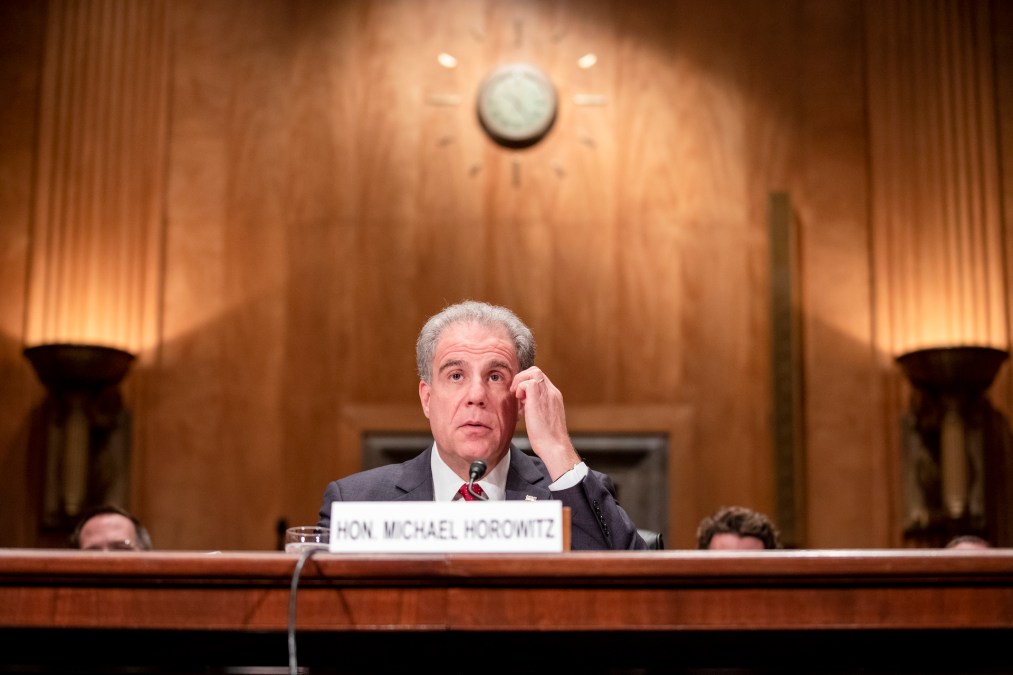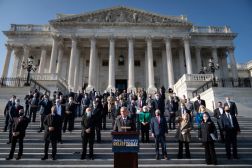Pandemic Analytics Center of Excellence will help IGs investigate fraud

The committee of federal watchdogs tasked by Congress to oversee emergency pandemic spending is developing a center of excellence that uses data analytics to combat COVID-19 relief fraud.
The Pandemic Analytics Center of Excellence, created by the Pandemic Response Accountability Committee (PRAC), will provide the federal inspectors general (IG) community with fraud-fighting tools allowing them to share data analytics and practices to assist with their audit and investigative work.
So far IGs have only managed to return or seize $2.5 billion of the $84 billion in potential fraud committed between the Small Business Administration‘s Paycheck Protection Program (PPP) and Economic Injury Disaster Loan (EIDL) program, according to a memo released by the House Select Subcommittee on the Coronavirus Crisis on Thursday.
“In order to fulfill the PRAC’s mission we need better technological tools for IGs and our oversight partners, including the use of advanced data analytics,” said PRAC Chair Michael Horowitz, IG of the Department of Justice, during a subcommittee hearing the same day.
The Coronavirus Aid, Relief, and Economic Security (CARES) Act created PRAC, which is comprised of 22 IGs from across government who are charged with seeing to it that federal funds, like those in the CARES Act and the American Rescue Plan Act, are spent properly. The committee is working with the Office of Management and Budget and other agencies to address fraud data gaps.
Despite the $84 billion potentially lost to fraud, Republicans on the House subcommittee touted the fact SBA used the PPP and EIDL programs to quickly give $910 billion in COVID-19 relief to small businesses.
“[T]his subcommittee is focused on attempting to tear down a bipartisan program that kept the economy afloat during the early and toughest days of the pandemic,” said Rep. Jim Jordan, R-Ohio, the ranking member. “We all agree fraud is bad. But we should all agree that a 99% success record is unprecedented, and we have President Trump to thank for that.”
But $84 billion in fraud would be more than 9% of the money SBA distributed, and the agency’s IG found the Trump administration ignored fraud flags, awarded loans with little to no vetting and abandoned a rule that two employees approve applications in the case of EIDL. Proper controls were added to SBA’s electronic loan application system, E-Tran, too late in the case of PPP.
Then-Treasury Secretary Steve Mnuchin cited the need for speedy loan delivery for the inevitable problems that arose at the time.
“Let me be clear: That is a false choice,” said Rep. Jim Clyburn, D-S.C., chair of the subcommittee. “Americans should not have to and did not have to choose between quickly getting aid during a crisis and preventing the theft or waste of billions of tax dollars.”
SBA has yet to conduct a formal fraud risk assessment for PPP or EIDL.
COVID-19 relief fraud investigations will continue for a decade because that’s how long the loans will be in SBA’s portfolio, said Mike Ware, IG at SBA.
“As we continue to address our processing backlog, we will employ data analytics to further triage and guide these efforts,” Ware said. “Data analytics have made a difference in our office’s ability to keep our stakeholders currently and fully informed in a timely manner.”
The SBA Office of Inspector General overlaid its data with the Treasury Department‘s Do Not Pay list and found “quite of bit of money” went to people who should never have been paid, Ware said. Analytics also helped catch duplicate PPP payments.
A problem with lists is that the fraudsters on them quickly learn to steal other people’s identities in order to continue their work. And identity theft was prevalent in EIDL fraud cases and reared its head with PPP loans as well, Ware said.
Some in the tech industry have advocated for automated screening as a fraud deterrent, in lieu of lengthy, inefficient investigations after the fact.
But the first three supplemental appropriations SBA OIG received to improve COVID-19 relief oversight were put toward recruiting auditors, analysts and criminal investigators; EIDL fraud investigative staff and data analytics; and increasing investigative capacity, Ware said.
A total of $142 million was allocated to the oversight community in the American Rescue Plan Act passed earlier this month.
“The Biden administration and Congress have also worked together to ensure that critical oversight bodies like the PRAC, [Government Accountability Office] and IG community have the resources and tools they need to do their jobs,” Clyburn said.




